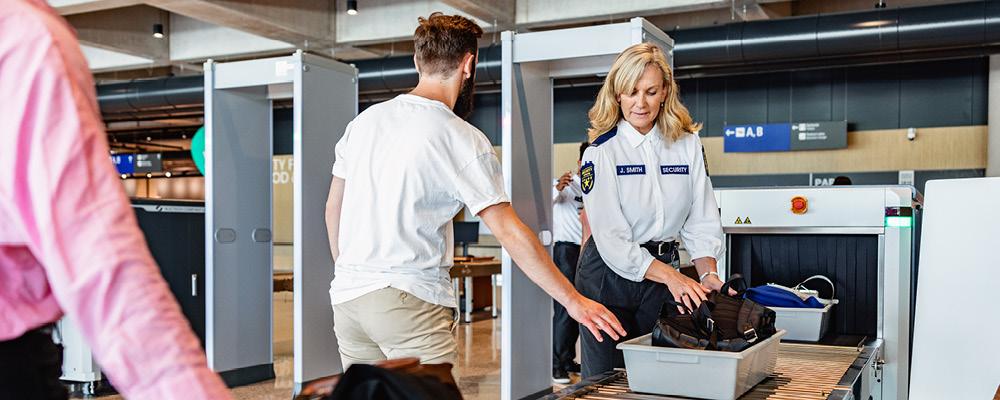
Know the latest baggage and medication rules
As a corporate traveller, the last thing you need is a preventable delay or hiccup throwing your precisely planned schedule into disarray. Avoiding snafus and staying one step ahead is the name of the game for productive business travel.
Get up to speed on these new airport rules and destination regulations that could save you a massive headache before your next big work trip.
A little proactive preparation is always easier than trying to untangle a mess from the road.
OR Tambo cracks down on irregular bags
Only regularly shaped bags with at least one flat surface will be accepted going forward. So leave those funky cylindrical or totally formless duffels at home. Extended trip bags with crisscrossing straps and grips are also a no-go for the baggage handling system. They're the root cause of most baggage snags.
Bags not making the cut can be wrapped through the airport-approved baggage wrapping at the airport to create that required flat side, but you'll likely have to pay for the service. It's a hassle, but infinitely better than dealing with lost or severely delayed luggage while trying to make a meeting or event.
Checked baggage new rule summary:
- Only regular-shaped bags will be allowed to be checked in. This means that the bags must have at least one flat surface to be accepted
- Round or irregular-shaped bags will not be allowed
- Bags with longs straps will not be allowed
As an expense-conscious business traveller, the choice is yours - a minor up-front cost or potentially being stuck high and dry without luggage. For many, that's an easy call to just follow the rules!
Medication protocols for UAE stopovers

Travelling with medication? With the United Arab Emirates being a major gateway for international business travel, it's critical to get familiarised with their zero-tolerance medication laws and entry requirements to avoid any nasty surprises.
The UAE keeps a list of 71 controlled substances and narcotic drugs like codeine, sedatives, and prescription stimulants that are essentially forbidden without following pre-approval protocols. If your medication is on that no-fly list, you'll need to apply for permission from the UAE Ministry of Health and receive written clearance before you can board that connecting flight.
But the regulations get even trickier for non-controlled drugs too. You should have physical prescriptions for any medication you need to bring, even basic over-the-counter ones in some cases. The UAE is extremely strict, so it's better to be over-prepared than risk getting stopped, detained, or even arrested for improper documentation or meds.
Here’s what you need to know:
1. Check if your medication requires approval
You'll need to confirm if any medication you take is defined by the UAE government as narcotic, controlled, semi-controlled, psychotropic, or prohibited. You can check the status with the UAE health authorities. Keep in mind that medications may have different names in other countries, so review the list thoroughly with your doctor.
If your prescribed medication is on the controlled list, it doesn't necessarily mean you can't bring it into the UAE. However, you will need to create an account with the UAE Ministry of Health and submit an online request for approval. Approved quantities are typically limited to 30 days' worth of medication.
Note that common drugs like codeine (over 30mg dose) and pseudoephedrine are on the controlled list. Find the main information page and e-service request link here.
Once approved online, you must print the documentation and carry it along with your medication in original containers and a valid prescription (in English or Arabic only) when travelling.
You'll also need an authenticated certificate or permit from the health authority in your home country confirming your legal access to the prescription drug for personal use - ask your doctor for assistance obtaining this document. These requirements apply whether transiting or staying in the UAE.
2. Non-controlled medication protocol
If your medication is not on the prohibited list, you can bring it into the UAE along with a valid prescription (in English or Arabic). Non-controlled quantities are typically limited to 90 days' worth.
For non-prescription, over-the-counter medications, you may still need a doctor's prescription note for entry into the UAE, so it's wise to get the documentation even for basic medicines like pain relievers.
3. Permitted medicines like paracetamol
Some herbal medicines and OTC drugs like paracetamol/acetaminophen are generally allowed in limited quantities without requiring approval or a prescription. However, dosages and allowances can vary, so refer to the UAE's guidelines.
If you have any other concerns about bringing medication for the UAE leg of your travel, and what the permitted drug amounts are, contact your dedicated travel manager or the UAE health authorities at mohap.gov.ae.
New air travel rules mean business

As a business traveller, you know the drill - prevention is better than cure when it comes to avoiding headaches and protecting your schedule. Get familiar with the latest rules and policies at your connecting airports and destinations to steer clear of any unnecessary turbulence.
Take an hour to ensure you've dotted those i's and crossed those t's, and your next work trip will flow smoothly from gate to overseas meeting and back again. Remain blissfully unaware of the hurdles between points A and B, and... well, you know how that movie ends.
Let's make it smooth sailing with Corporate Traveller's risk management solutions! Keep your team safe and your trips hassle-free. Reach out and let's turn those travel worries into wins!